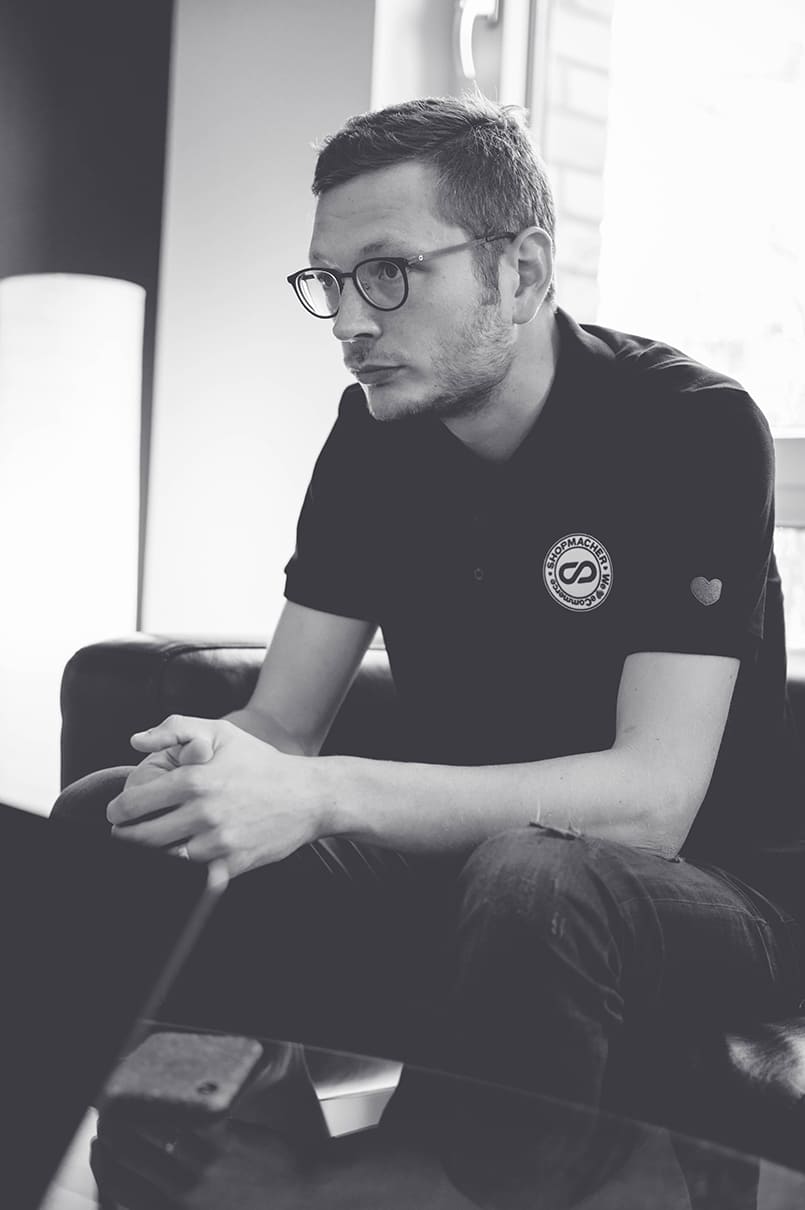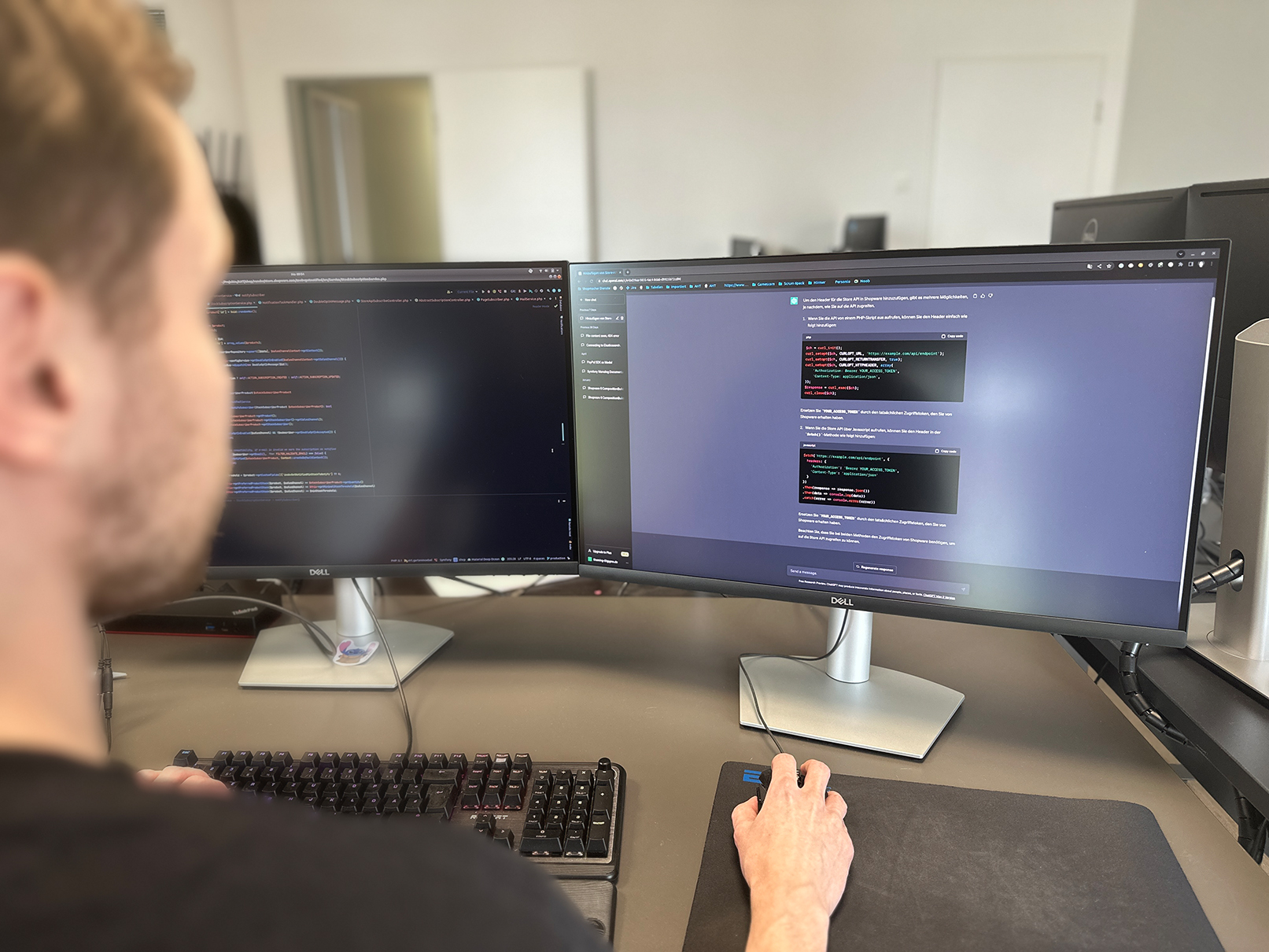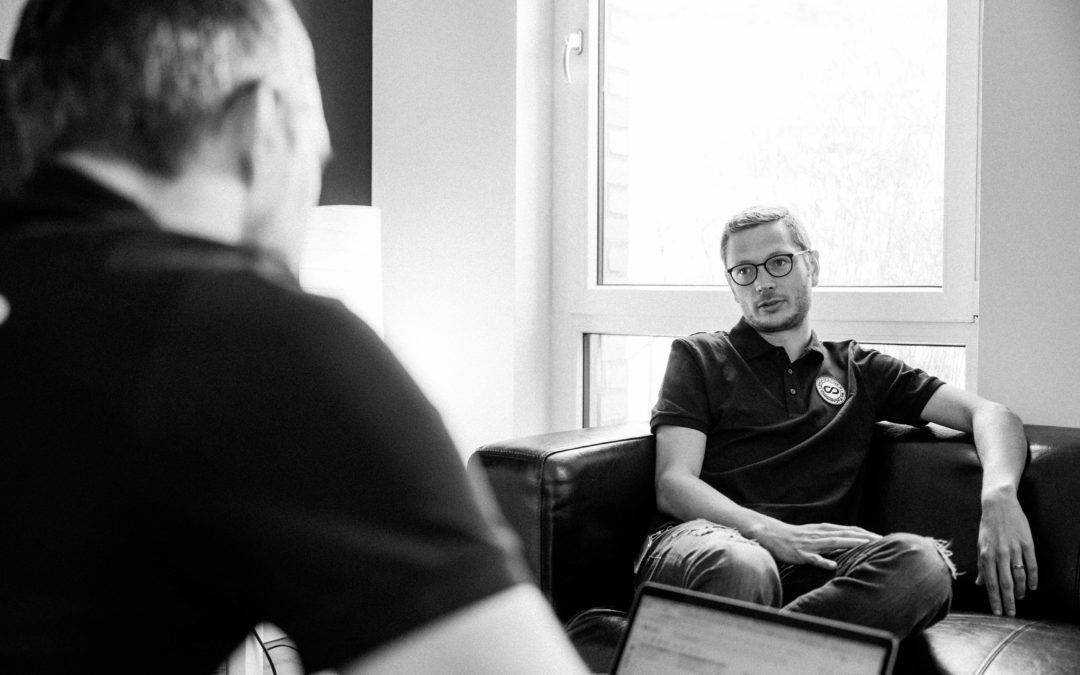How to future-proof your tech stack or: Forget ChatGPT, do your basic homework!
Which channels will we use to sell tomorrow? And will online demand continue to fall or rise sharply again? Today, anyone facing the purchase of new software for their platform must consider many factors. Our CTO Manuel Ludvigsen-Diekmann answers some key questions.
From your point of view, what makes an e-commerce solution sustainable?
Manuel:
From our point of view, it is essential today
that all systems can be easily connected via APIs. Dealers should have the option of simply replacing technically obsolete systems. We don’t know today how we will sell tomorrow. Is it then still the app, the browser, the POS? Or a VR application? Here you should as flexible as possible
be set up.
Also important is good
workflow management. After all, it is the processes that ultimately make companies successful. At some point, whoever takes two years to even start the first tests is completely irrelevant. In the Corona pandemic, for example, those who had their workflows under control and could activate their own logistics benefited.
Also the Pricing is also a decisive factor: Anyone who believes that they can on-premise license to be on the safe side, he is mistaken. Of course, then you have the code. Aber what happens when the manufacturer no longer cares about updates and security? Theoretically, the dealer could then take care of it himself. In practice, however, this will not work.
At Software-as-a-Service offerings resellers should not be should not be fobbed off with two-year contracts.. This is because manufacturers often make classic offers and two years later, when their own online business is booming, the solution suddenly costs twice as much. Switching to an alternative store software solution takes time. And in the meantime, you pay. Of course, with a five-year contract, there will always be a price increase. But that can then be planned.
And finally, one should also ask critical questions: Are the promises of the manufacturers just marketing or can the solution really do that right now? It makes a difference if a solution has already proven in several cases that it can do something, or if you are the first to implement such a case. If I’m the first to do everything, I’ll pay a lot of dues if I’m in doubt.

Manuel Ludvigsen-Diekmann,
CTO SHOPMACHER
When you choose a new store software together with the customer, what criteria do you use to decide who gets the contract?
Manuel:
Above all, we try to find out what the customer is really good at – and what he’s not yet.
Does he have IT experience?
Does he have own team on site?
Does the customer need a visual CMS, does he know HTML?
Or does he need a classic editorial system with 30 fields that he can fill in – without any influence on how this is then visually displayed?
Is it okay to work in multiple systems (PIM, frontend CMS, commerce backend, search) or is a simple SaaS solution better, to which you dock a search at most?
And then, of course, it also depends on the Goals an: A large company that wants to go live with just one sub-brand and put ten products online needs a different tech stack than someone who goes live with ten items today, wants to roll out the store in five languages in six months, and plans to expand B2B or integrate online courses in 18 months.
However, it is not uncommon to make a technology decision based on strategic planning. technology decision and then, after two years, throws the strategic planning out the window. And this is often not even due to poor planning, but simply to the fact that technologies are simply developing at an insane pace.
What are typical questions that customers ask you?
Manuel:
Usually they ask: “How long will it take and how much will it cost?” And honestly, in both cases you would first have to say: “I can’t answer that seriously today.” But you never get into the making that way. That is why we start with rough budgetswhich we then successively sharpen.
Because especially at the beginning cooperation, it is often difficult for us to difficult to estimatehow far we can be involved in the workflows of the customers can penetrate. And when we then take stock and ask what a company intends to do with the systems, we often find out relatively quickly: In the beginning, we talk to people who would like to do something. But when the project starts and the people who are to implement it are on board, completely new requirements arisebecause, for example, the systems can’t do what they’re supposed to. That’s where projects become problematic.

If we venture a look into the near future: How will the market for store software develop in the foreseeable future?
Manuel:
I think that manufacturers will focus even more on SaaS offerings and components will focus on. However, there will also be some who use the buzzword “cloud” or “platform-as-a-service” to disguise the fact that they don’t have a true SaaS solution at all.
I am also convinced that customers have less and less desire to go along with the large migration and maintenance waves.. This is what the manufacturers will adjust to. Some vendors are radically changing their software architecture, pricing and service model with this trend in mind. This means that even the “old” existing customers are facing a change because the security patches are expiring.
This will keep some classic store agencies afloat for the next two to three years, because a great many systems in the market will have to be migrated. But what comes after that, when these migrations are completed and the maintenance efforts are much lower?
And I think that there are some simple issues that are more of AI-driven will be. For example, we recently spoke with a manufacturer from Scandinavia where dealers can’t configure anything at all. They just give the provider their data feed, and an algorithm does the rest. Those who have their own e-commerce team may not take advantage of such an offer. But if you can’t or don’t want to do that, you’re better off with such a standard offer than doing nothing at all.
Overall, I see that many dealers in Germany still have basic homework have to do. The whole world can talk about ChatGPT – for us, almost every project starts with the Product master data need to revise. Digital consulting is all well and good, but now it’s important to get all the Basic processes to optimize. Because if demand continues to fall, it will become massively more difficult for retailers with poor processes to survive.
ALSO INTERESTING

Level upgrade: gamescom now trusts SHOPMACHER again
After two years in which gamescom was held exclusively online, the world’s largest games event will become a hybrid event this year. Shopmacher is responsible for the further development of the digital customer experience on the “gamescom now” content hub.

The most important ShopTech requirements 2023
The vendor market for commerce solutions is on the move. Experts see a move toward composable commerce and cloud-based solutions. What should a future-proof commerce system look like? Manuel Ludvigsen-Diekmann, CTO of SHOPMACHER, joins two other commerce experts to talk about the most important ShopTech requirements for 2023.

How 1A Medizintechnik and SHOPMACHER digitize the procurement of emergency equipment for emergency services
Many rescue stations still work very analogously today. In order to reorder products, the paramedics often walk through their warehouses themselves with pen and paper and note what is missing. An office worker then types the note, the supervisor acknowledges it and the order is sent to the wholesaler by fax or telephone.